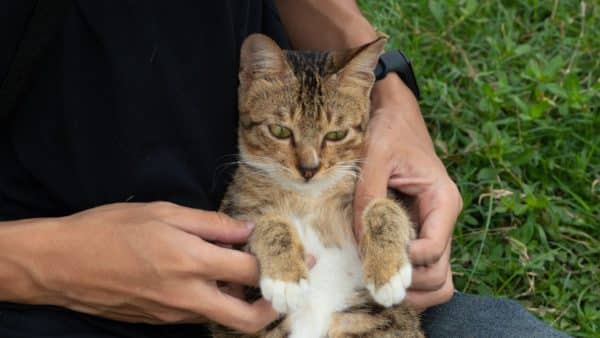

The Feline Leukemia Virus infection (FeLV) is the number one killer of domestic cats. It is one of the deadliest diseases that our feline friends can suffer from and it is extremely contagious.
Once a cat becomes infected, they can transmit the virus through their feces, saliva, and urine, and even their blood. Outdoor cats are more likely to get this disease compared to indoor ones.
This infection can be prevented, so talk to your veterinarian about administering a vaccine for your cat. If a cat does catch the disease from another animal, they could develop some of the following symptoms:
FeLV produces a number of modifications inside a cat’s body, but it mostly attacks the animal’s immune system. If they become infected, kittens can lose their life in a matter of just several days as their immune response is not up to par. Given the severity of this disease, we recommend that a booster shot is administered to your pet every year.

While there are many reasons why an adult cat or kitten can become sick, one of the most common and potentially lethal conditions in this species is in fact, a set of diseases — it is called FLUTD and encompasses all of the illnesses of the urinary tract.
Unneutered pets are more likely to develop urinary complications as their anatomy makes it very difficult, if not impossible to eliminate the crystals from their urine, especially when they are in heat. For this reason, many vets recommend neutering as a healthy way of preventing lithiasis in male cats.
Diseases of the urinary system are more likely to affect overweight cats or those that are very stressed. It also seems to appear more frequently in cats that are kept indoors but that have to share their living space with other feline friends.
Here are some symptoms of FLUTD in cats:
Prevention of FLUTD is possible if you take your cat to the animal hospital once or twice a year for regular check-ups. Your veterinarian might be able to tell some early signs of feline urinary tract health issues by performing blood and urine tests.
While some urinary infections can easily be treated with antibiotics, the same does not apply to kidney disease. The kidney has a functioning unit called the glomerulus and if it gets damaged, the cat effectively loses functionality of the entire organ.
Cats can suffer from colds just like humans can. Upper respiratory infections can be quite common in cats and while most of them are viral, they don’t have to be highly contagious or produce severe symptoms.
Most cats that have a URI will show the following signs:
If your cat has developed an unspecific respiratory infection, it might not present a very serious health risk to them. However, they could spread it to other cats they come into contact with.
If you care for several different cats, it is highly important to isolate the pet that has become sick from the rest. Avoid using the same food and water bowls for the same reasons.
This metabolic disease tends to affect overweight and obese cats more than the rest. While it is true that there are cats that can have Type I diabetes, just like people, Type II is a lot more common among these pets.
However, if your kitten becomes insulin-dependent, you will have to give her a shot every day or as per your veterinarian’s instructions. Sometimes, with the right diet and the right treatment, Type I diabetes can turn into Type II, which is far easier to manage.
In any case, diabetes is a serious disease in pets and humans alike as it affects their general health on the whole. Diabetic pets have a higher risk of experiencing a plethora of health complications ranging from not being able to recover from injuries as easily to suffering recurring urinary tract infections. Contact your vet to find out what treatment they recommend for your diabetic cat.

Like Feline Leukemia, FIV is caused by a virus that affects a cat’s immune system. Unfortunately, it can take a while for the cat to show any symptoms after becoming infected, and by the time they do begin to show any clinical signs, the disease might have led to severe changes in their body.
According to some studies, this condition might be passed from parents to kittens, but it is far more likely for cats to get it through the bites of other infected animals.
If a pet gets FIV, they will show the following symptoms:
Cats that are infected should be kept in a clean and safe environment at all times so as to avoid coming into contact with pets that might have other diseases. Their immune system doesn’t work well, which is why they could develop a severe form of any ordinary infection.
Out of all of the cat diseases that we are showcasing here, Feline Panleukopenia (FPV) is one of the most contagious ones. Like the other viral diseases that we have described, this one also targets the cat’s immune system, but it also aims at their nervous system, too.
The virus often leads to severe heart disease, which could cause death especially in kittens and geriatric cats. Some of the symptoms that can be noticed in a cat that has FPV are the following:
Upon becoming a kitten parent, the veterinarian will advise you as to what vaccinations are mandatory and which ones you can do without. Due to how infectious it is and how deadly, a vaccine against Feline Panleukopenia has to be administered as early as possible.
Kittens can be immunized against the disease with a vaccine starting at the age of eight to nine weeks. A booster is given 3-4 weeks later and then one every year along with the rest of the vaccinations.
Cancer is a disease that tends to affect older cats, although it has been shown to affect young and healthy adults in some cases, too. Some of the most common types of cancer that cats can develop are the cancer of the skin, mammary gland, and cancer of the digestive tract.
The latter is closely related to the FeLV infection as it can produce a gastrointestinal form in sick animals.
The exact causes of cancer remain unknown to this day, in both pets and humans. Some cats can be genetically predisposed to getting one type or the other, but they might also be more likely to get it if they come into contact with carcinogenic substances from food or their environment.
Also, cancer can be produced by some viruses (called oncogenic), which cats can get from other animals outside.
While some cancer types cannot be treated as they might have spread to other organs, sometimes making therapy completely ineffective, some treatments might work in other forms. For example, your veterinarian can recommend surgery, radiotherapy, or chemotherapy or a combination of these treatments.
When diagnosed in time, even some aggressive types of cancer can be treated. However, this would mean that you should take your cat regularly to the vet hospital so as to prevent this disease.

Rabies has become a less common infection these days in both pets and people. It is caused by one of the deadliest viruses that exist in the world and to date, there is no treatment available for either animals or humans.
Getting your cat vaccinated against rabies is essential for your pet’s protection and your own. Wild animals such as raccoons and foxes are the most likely carriers of the virus, so cats that live outdoors are more exposed to coming into contact with the pathogen.
The vaccine is mandatory if you want to travel from one state to another or to a different country. Rabies prevention is taken very seriously by animal control associations across the world, so make sure your cat has the right vaccines to be able to travel with you.
If you know that your cat was bitten by a wild animal and she hasn’t been vaccinated against rabies, it’s important to get in touch with your vet and your local authorities. Rabid animals show the following symptoms:
Cats can get a variety of intestinal parasites throughout their life. Kittens are more exposed to this health issue as they might suffer severe consequences. If a parasite infestation is severe, it effectively makes it impossible for the pet to benefit from any nutrition.
Most intestinal worms consume the food that your cat eats, which means that not only will the animal lose weight, but they’ll also try to compensate by being absolutely ravenous. The worms can migrate to other organs besides the intestines, sometimes reaching the heart or the lungs.
Moreover, any pet that has an intestinal worm population, whether of tapeworms, roundworms, or hookworms, is a carrier. This means that they can be a danger for other cats they come into contact with.
Parasites can be more or less easy to treat, but you have to talk to your veterinarian, find out what dewormers they recommend, and know when to administer the medications. Most pet owners choose to give their cats dewormers every 3 to 4 months just to be on the safe side of things.
This is one of the most common feline diseases that exist. It is estimated that about one-third to half of all cats are likely to come into contact with the pathogen that produces it, a bacterium called Bartonella Henselae.
Although the vast majority of cats do not experience severe symptoms, some might develop complications. For example, infected animals might show signs such as vomiting, tiredness, a decrease in appetite, red eyes, or swollen lymph nodes.
However, most other infected cats only experience a slight fever and inflammation at the site where they were bitten by another infected pet or by a flea.
The biggest problem with this disease is not the symptoms that it produces in our feline friends rather the fact that it can be transmitted to humans. Most people are asymptomatic as their immune response is sufficient to fight the disease naturally, but this infection can be quite dangerous for people who have an auto-immune disease, diabetes, or cancer.
Toxoplasmosis is another rather widespread disease. The infection is more common in cats that spend a lot of time outdoors and that might engage in hunting small rodents or birds. The parasite can survive in the outdoor environment for several months, so your pet is almost always at a high risk of catching it.
Some cats might not show any symptoms at all, which makes diagnosis a bit challenging. However, the biggest issue with Toxoplasmosis is the fact that it can be transmitted to people.
It is particularly dangerous for pregnant women. Handling feces or drinking water contaminated with cat feces are two ways in which people can contract the disease.
If you are planning a pregnancy, it is a good idea to have your cat tested for Toxoplasmosis. Your veterinarian can perform a very simple blood test that can reveal if your cat is a carrier. You do not have to give up your pet in case the result is positive — pregnant women are only supposed to be very careful when handling a cat’s feces so as to avoid touching it.
We hope that our list of some of the most common feline diseases has helped you understand that paying attention to your cat’s behavior and any changes in it can help you enjoy a happy and healthy pet for as long as possible.
Cats can develop other health problems ranging from indigestion to hyperthyroidism. As your cat ages, they will become prone to other conditions, such as chronic heart disease, urinary tract infections, and other complications.
As a responsible pet owner, you will have to maintain contact with your veterinarian and make sure to manage these illnesses as best as possible. Also, do consider that cats that regularly go outside have a higher risk of contracting viruses, bacteria, fungi, and parasites, which can all potentially endanger their life.
Most of us train our dogs when they are puppies to jump up on furniture. We think it’s harmless (and easier than always lifting them), but for dogs, couches and beds are very high compared to the size of their bodies.
Every time they jump it compresses their back and applies enormous force to their joints.
It’s no wonder that an incredible 80% of dogs experience arthritis or joint pain by only 7 years old.
Luckily, there is a vet-recommended solution.
It’s the PawRamp by Alpha Paw. An adjustable ramp that allows dogs to safely get on and off couches and beds. PawRamp makes joining you in bed or on the couch effortless and fun.
As a bonus, you can use code SAVE35 to get $35 off the PawRamp today.

The medical, nutritional, or behavioral advice we provide is intended for informational and educational purposes only. Our editorial content is not a substitute for formal or personalized medical advice from a veterinary professional. Only board-certified veterinary specialists who have examined your pet should diagnose medical conditions, provide personalized treatment, or prescribe appropriate medication. For questions regarding your pet’s health, or if your pet is exhibiting signs of illness, injury, or distress, contact your veterinarian immediately. Never disregard professional medical advice or delay in seeking it because of something you have read on our site.